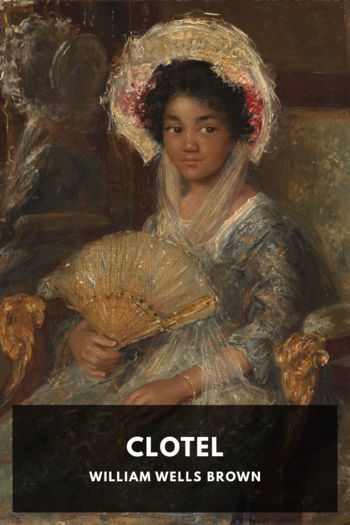Clotel, William Wells Brown [i like reading books .txt] 📗

- Author: William Wells Brown
Book online «Clotel, William Wells Brown [i like reading books .txt] 📗». Author William Wells Brown
Nearly 4,000 slaves were collected from the plantations in the neighbourhood to witness this scene. Numerous speeches were made by the magistrates and ministers of religion to the large concourse of slaves, warning them, and telling them that the same fate awaited them, if they should prove rebellious to their owners. There are hundreds of negroes who run away and live in the woods. Some take refuge in the swamps, because they are less frequented by human beings. A Natchez newspaper gave the following account of the hiding-place of a slave who had been captured:
A runaway’s den was discovered on Sunday, near the Washington Spring, in a little patch of woods, where it had been for several months so artfully concealed under ground, that it was detected only by accident, though in sight of two or three houses, and near the road and fields where there has been constant daily passing. The entrance was concealed by a pile of pine straw, representing a hog-bed, which being removed, discovered a trap-door and steps that led to a room about six feet square, comfortably ceiled with plank, containing a small fireplace, the flue of which was ingeniously conducted above ground and concealed by the straw. The inmates took the alarm, and made their escape; but Mr. Adams and his excellent dogs being put upon the trail, soon run down and secured one of them, which proved to be a negro-fellow who had been out about a year. He stated that the other occupant was a woman, who had been a runaway a still longer time. In the den was found a quantity of meal, bacon, corn, potatoes, etc. and various cooking utensils and wearing apparel.”—Vicksburg Sentinel, Dec. 6th, 1838.
Currer was one of those who witnessed the execution of the slave at the stake, and it gave her no very exalted opinion of the people of the cotton growing district.
IV The Quadroon’s HomeHow sweetly on the hillside sleeps
The sunlight with its quickening rays!
The verdant trees that crown the steeps,
Grow greener in its quivering blaze.
About three miles from Richmond is a pleasant plain, with here and there a beautiful cottage surrounded by trees so as scarcely to be seen. Among them was one far retired from the public roads, and almost hidden among the trees. It was a perfect model of rural beauty. The piazzas that surrounded it were covered with clematis and passionflower. The pride of China mixed its oriental-looking foliage with the majestic magnolia, and the air was redolent with the fragrance of flowers, peeping out of every nook and nodding upon you with a most unexpected welcome. The tasteful hand of art had not learned to imitate the lavish beauty and harmonious disorder of nature, but they lived together in loving amity, and spoke in accordant tones. The gateway rose in a gothic arch, with graceful tracery in ironwork, surmounted by a cross, round which fluttered and played the mountain fringe, that lightest and most fragile of vines. This cottage was hired by Horatio Green for Clotel, and the quadroon girl soon found herself in her new home.
The tenderness of Clotel’s conscience, together with the care her mother had with her and the high value she placed upon virtue, required an outward marriage; though she well knew that a union with her proscribed race was unrecognised by law, and therefore the ceremony would give her no legal hold on Horatio’s constancy. But her high poetic nature regarded reality rather than the semblance of things; and when he playfully asked how she could keep him if he wished to run away, she replied, “If the mutual love we have for each other, and the dictates of your own conscience do not cause you to remain my husband, and your affections fall from me, I would not, if I could, hold you by a single fetter.” It was indeed a marriage sanctioned by heaven, although unrecognised on earth. There the young couple lived secluded from the world, and passed their time as happily as circumstances would permit. It was Clotel’s wish that Horatio should purchase her mother and sister, but the young man pleaded that he was unable, owing to the fact that he had not come into possession of his share of property, yet he promised that when he did, he would seek them out and purchase them. Their firstborn was named Mary, and her complexion was still lighter than her mother. Indeed she was not darker than other white children. As the child grew older, it more and more resembled its mother. The iris of her large dark eye had the melting mezzotints, which remains the last vestige of African ancestry, and gives that plaintive expression, so often observed, and so appropriate to that docile and injured race. Clotel was still happier after the birth of her dear child; for Horatio, as might have been





Comments (0)